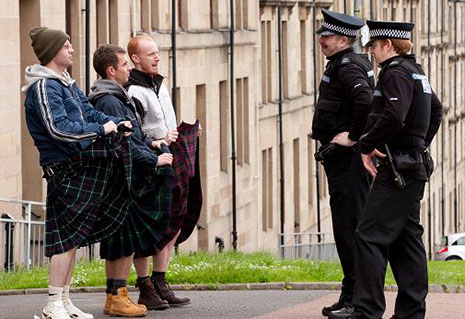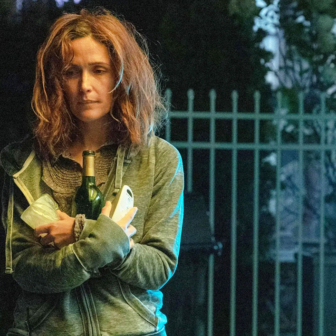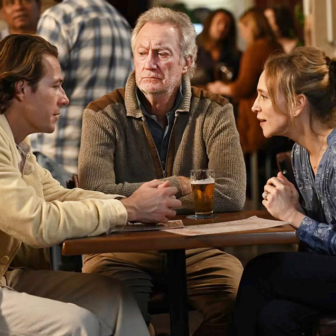LAST week England’s most senior director, Ken Loach, declined his award for lifetime achievement from the current Turin Film Festival, and announced that he wouldn’t attend the screening of his new film, The Angels’ Share, winner of the year’s Jury Prize at Cannes. Loach’s reasons, at first unclear, had to do with protests against pay cuts by the workforce of the Turin film museum, principal sponsor of the festival. The screening was cancelled, so the film lost exposure; but Loach’s demonstration of solidarity was consistent with his lifelong politics and with the sympathies played out in all his films. It will be remembered that he pulled his last film, Looking for Eric, from the 2009 Melbourne Film Festival program when he learned that the festival was supported by funds from Israel (among many other sources). That was the Melbourne festival’s loss, as this year’s principled decision by Loach is Turin’s.
Going in to watch The Angels’ Share, I know from its repute that this time Loach, with all his grip on politics and human misfortune, will let us down lightly. It won’t be another Kes, nor another of The Wind that Shakes the Barley, where he took on the weight of history in the Irish troubles, and steered us through a gruelling struggle that set brother against brother. But even in his most cheerful outing, Loach will still be dealing in gritty realism and taking risks. Some critics don’t feel that this time he and his frequent writer-collaborator, Paul Laverty, have got away with their uneven mix of rough horseplay, comic capers, and long-range echoes of Whisky Galore; I think it comes off, and that’s a matter of orchestration, and the array of sympathies in the casting. We know from the start that the young, delinquent Robbie (Paul Brannigan) will blunder toward an outcome that gives him half a chance – maybe no more than that; it will be precarious, and there will be a very cautious kind of hope.
Guilty of a violent assault, Robbie has to face his victim, and the victim’s family, in court. The milieu he shares with his feckless mates is at once palpable and understated: under-education, long-term unemployment, the dreariness of public housing; it’s Glasgow, of course, not Edinburgh. When the little gang is on a trip to Edinburgh, its least-gifted member, Albert (Gary Maitland) fails to recognise the castle. Their benign supervisor, Harry (John Henshaw, in a wonderful performance) says gently, “Is there no shortbread in your house?”
Thanks to an energetic defence lawyer, who swears that he’s mending his ways, Robbie is let off a prison sentence and committed to community service. His girlfriend Leonie (Siobhan Reilly) has their baby, and demands some responsibility from Robbie, who discovers feelings he never dreamt of, and promises his son a better life. The forward path takes him and others on an educational trip to a distillery; it is discovered that he has a gift, a rare discerning nose for the refinements of single malt. (The film’s title, we discover, names the 2 per cent of the barrel which evaporates during maturation.) In the tour of the distillery and the high-toned spiel of the whisky expert Rory McAllister (Charlie MacLean), Loach maps the world of privilege which usually closes out the likes of Robbie and his kind; and the comic turn here is in the way Robbie turns the tables. He’s not headed for standard respectability.
All that is legible and enjoyable; along the way, however, we need subtitles for a good deal of the very thick Scottish brogue. That said, The Angels’ Share is a model of the small-scale feature film that can be developed when writer and director assemble the elements from a recognisable community. Whatever the older Loach has left behind, he’s kept his cunning.
AMONG current offerings, The Sessions has been highly praised for its treatment of a very difficult issue, the sexual needs of someone who is very seriously disabled. Mark O’Brien, a poet, was also a polio victim; in his mid-thirties, knowing his life would be curtailed, he sought the help of a professional sex surrogate so that he wouldn’t die wondering. After their regulation six sessions, with their unintended consequences, were over, he wrote about the experience, and Ben Lewin’s film is based on O’Brien’s article.
John Hawkes plays O’Brien, Helen Hunt the sex therapist Cheryl, and William H. Macy, with long hair, the liberated new-age Catholic priest and O’Brien’s regular confessor. When it comes to sex outside marriage, the priest has a perceptible struggle with himself before deciding that God will have to give Mark “a free pass.” The unintended consequences were the way sex became love, of a certain kind, between Mark and Cheryl, and how the developing tenderness must then include their way of letting go. Along the way, the other performances are entirely rewarding: the improbably named Moon Bloodgood as Vera, one of the several carers who get Mark from A to B on a gurney; Adam Arkin, as Cheryl’s husband Josh, who has to sort out a whole tangle of emotions, and nothing’s made easier because, as she tells Mark, Josh is a philosopher who lives mostly in his head. The most complex performance and the most interesting character, however, is Macy’s Father Brendan; in the margins of Mark’s and Cheryl’s story, he has one too. It’s readable only in eloquent fragments; you want to put them together.
MY APOLOGIES to readers of Inside Story who, for reasons beyond my control, got no film article in these columns for the past two months. The same reasons prevented my attendance at this year’s Palestinian Film Festival, which has now had its runs in Sydney, Melbourne and Perth, and is still to run this weekend in Brisbane. I hope to retrieve at least some of these films, and will comment on them if that is possible. In the meantime, I thank Hal Wootten for discussing the program with me.
In the past, Palestinian cinema has offered stories in which the protagonists negotiate divided identities, sometimes within the Israel-Palestine territories, sometimes outside them, and the drama is in the resolution, or perhaps its impossibility. That seems still to be the case. The conflicts are played out most obviously in Romeo and Juliet love stories, but no less in docu-dramas like the demanding Heart of Jenin (2008), in which we followed a Palestinian father on a gruelling peace mission, as he went visiting the Israeli families whose children had received the organs of his young son, killed by an Israeli sniper. Of that one and others, find the DVD if you can; and – probably not so difficult – revisit Hany Abu-Assad’s very fine Paradise Now (2006), which made the commercial circuits at the time, telling of two young men who struggle with and against their supposed duty to become suicide bombers. It would be an excellent thing if we could also find those films from the Israeli left, particularly the documentarists who oppose the occupation and transmit friendships, dialogue, complexity and comedy across the boundaries. I’ve seen a few of them – but only outside Australia. •





